As the COVID-19 pandemic carves its dark entry into the history of humankind, causing serious illness and death, and upending daily life as we know it, UN DESA is supporting the world to contain the calamity and emerge from it more resilient and united. As the pandemic challenges national health systems, shutters businesses large and small, and confines millions to their homes, it leaves the society’s most vulnerable groups exposed to its most destructive effects. UN DESA experts continue to closely monitor the economic, financial and social impacts of the crisis and is prepared to advise the UN Secretary-General and help Member States navigate the policy choices ahead in a way that leaves no one behind.
Statements
The world after COVID-19
 A global pandemic is a time of tough choices. The policy decisions taken now will shape the fate of millions and define the future of nations. How to save people’s lives without destroying their livelihoods? Where to allocate scarce resources? How to protect those who do not have the means to protect themselves? UN experts are working round the clock to help decision makers navigate these tough choices and prevent the world from sliding into a dangerous depression. Watch this space for the latest research, analysis and policy advice from UN DESA, an effort to support and complement the United Nations Secretary-General’s initiatives in response to the COVID-19 crisis.
A global pandemic is a time of tough choices. The policy decisions taken now will shape the fate of millions and define the future of nations. How to save people’s lives without destroying their livelihoods? Where to allocate scarce resources? How to protect those who do not have the means to protect themselves? UN experts are working round the clock to help decision makers navigate these tough choices and prevent the world from sliding into a dangerous depression. Watch this space for the latest research, analysis and policy advice from UN DESA, an effort to support and complement the United Nations Secretary-General’s initiatives in response to the COVID-19 crisis. 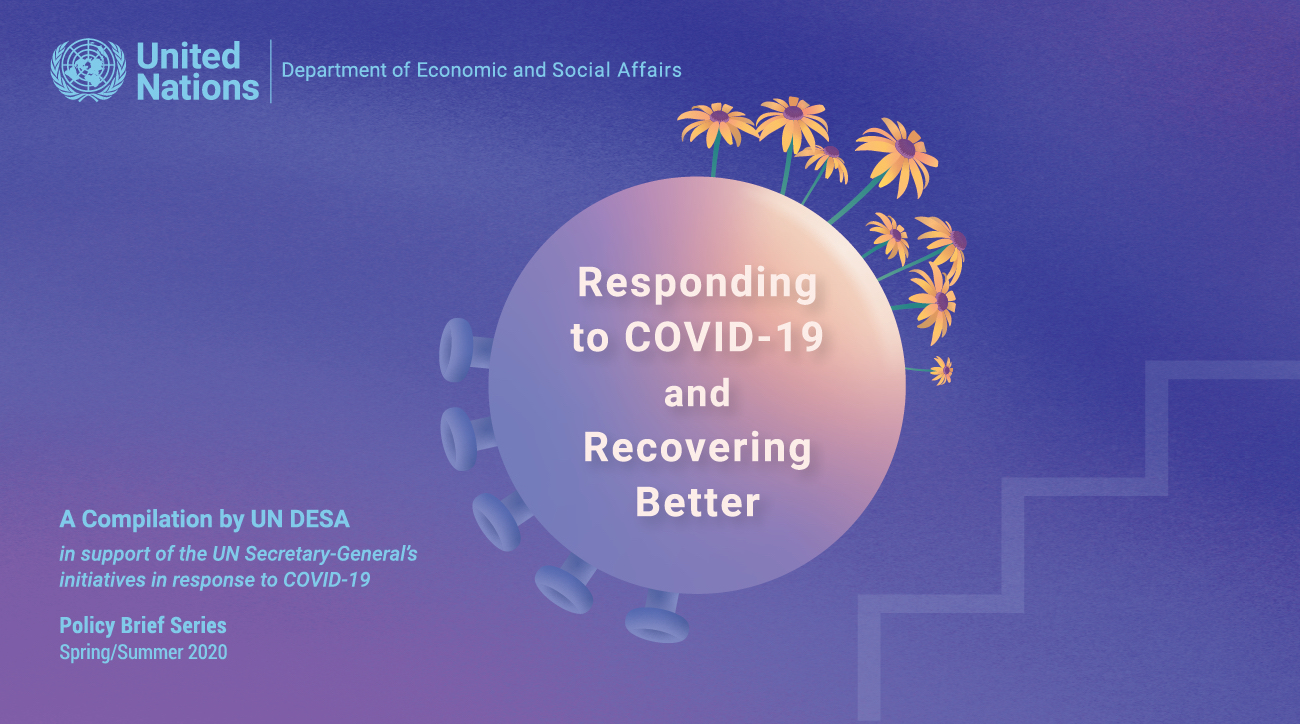
Responding to COVID-19 and Recovering Better is a compilation volume of UN DESA’s special policy brief series on the economic and social impact of COVID-19, which aims to complement and support the Secretary-General’s initiatives in response to COVID-19. It presents detailed analysis and solid evidence needed for effective decision-making on a number of critical social and economic issues - including designing inclusive stimulus packages; preventing a global debt crisis; supporting countries in special situations; protecting the most vulnerable groups of people; strengthening the role of science, technology and institutions for an effective response; and working together to build back better and achieve the 2030 Agenda for Sustainable Development.
Changes to calendar due to COVID-19
As a preventive measure amidst the coronavirus (COVID-19) pandemic, some of the high-level meetings organized by UN DESA worldwide have been postponed or cancelled. Others are still being reviewed. Click below to find the latest information on the affected events and check back regularly for updates.
UN DESA Calendar
Online Events

Join UN DESA’s Assistant Secretary-General for Policy Coordination and Inter-Agency Affairs Maria-Francesca Spatolisano, Fabrizio Hochschild-Drummond, Special Adviser to the Secretary-General on the Preparations for the Commemoration of the United Nations 75th Anniversary, and UN DESA experts for the second UN DESA Webinar on COVID-19: Strengthening Science and Technology and Addressing Inequalities on 6 May 2020, from 10 am to 12 noon EDT. You can watch a recording of this event on Facebook, at: https://www.facebook.com/joinundesa/videos/232320921359751 Access the presentation here.
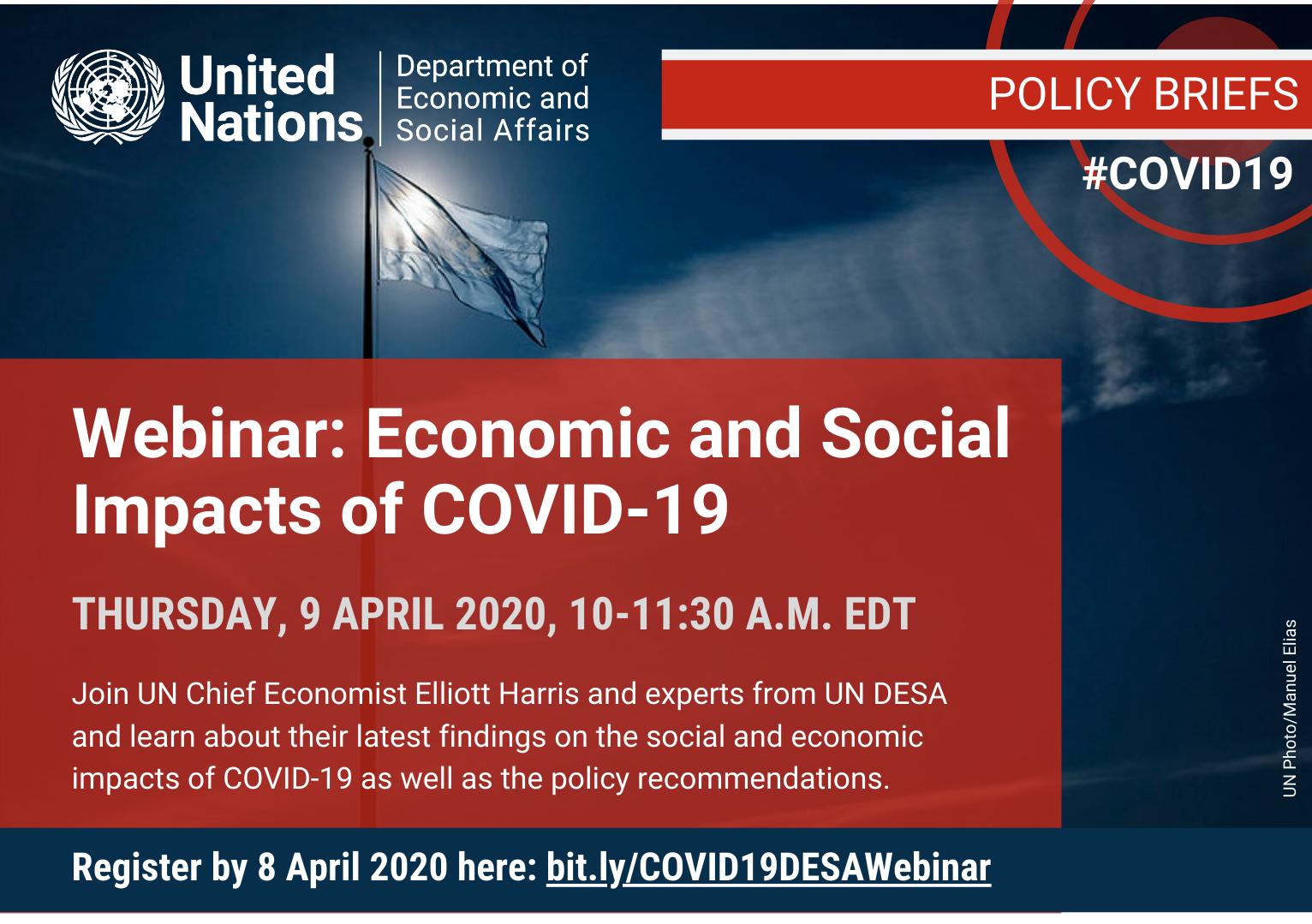
UN Chief Economist Elliott Harris and other experts from UN DESA have shared the main findings of three new briefing papers on the social, economic and financial impacts of COVID-19, as well as public policy recommendations. The online webinar took place on Thursday, 9 April 2020. You can watch a recording of this event on Facebook, at: https://www.facebook.com/joinundesa/videos/2506983762950816/ Access the presentation here.

 Statement on COVID-19 by Under-Secretary-General Liu Zhenmin
Statement on COVID-19 by Under-Secretary-General Liu Zhenmin Policy Brief 106: Reducing poverty and inequality in rural areas: key to inclusive development
Policy Brief 106: Reducing poverty and inequality in rural areas: key to inclusive development Policy Brief 107: Social protection in rural areas: achieving universal access for all
Policy Brief 107: Social protection in rural areas: achieving universal access for all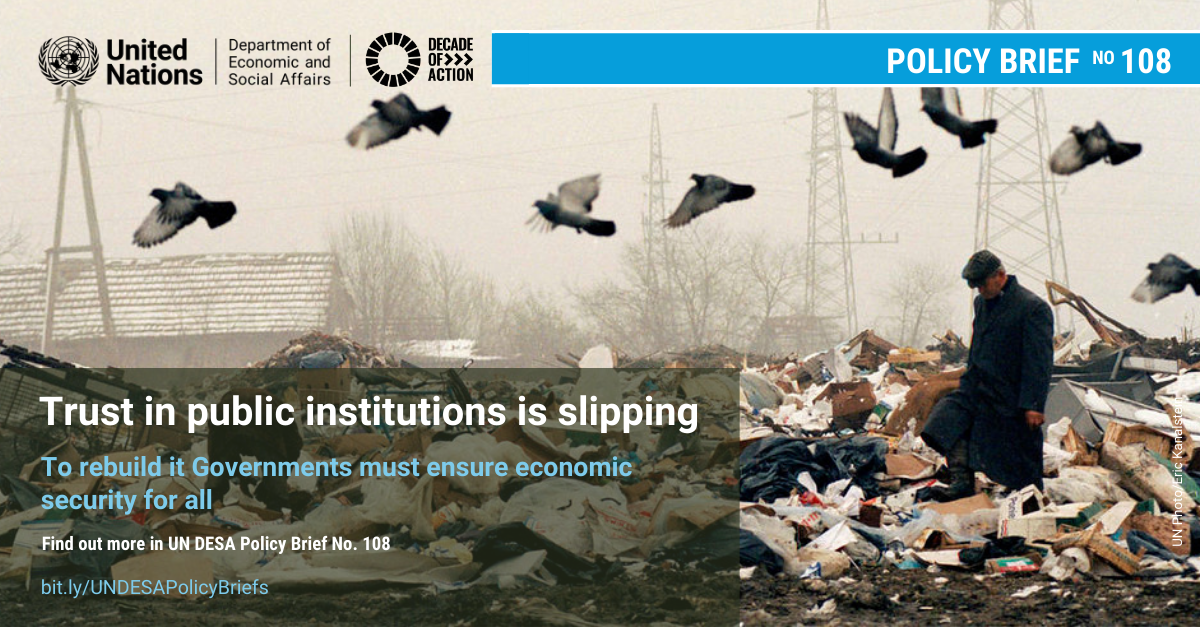 Policy Brief 108: Trust in public institutions: Trends and implications for economic security
Policy Brief 108: Trust in public institutions: Trends and implications for economic security Policy Brief 103: Transformational partnerships and partnership platforms
Policy Brief 103: Transformational partnerships and partnership platforms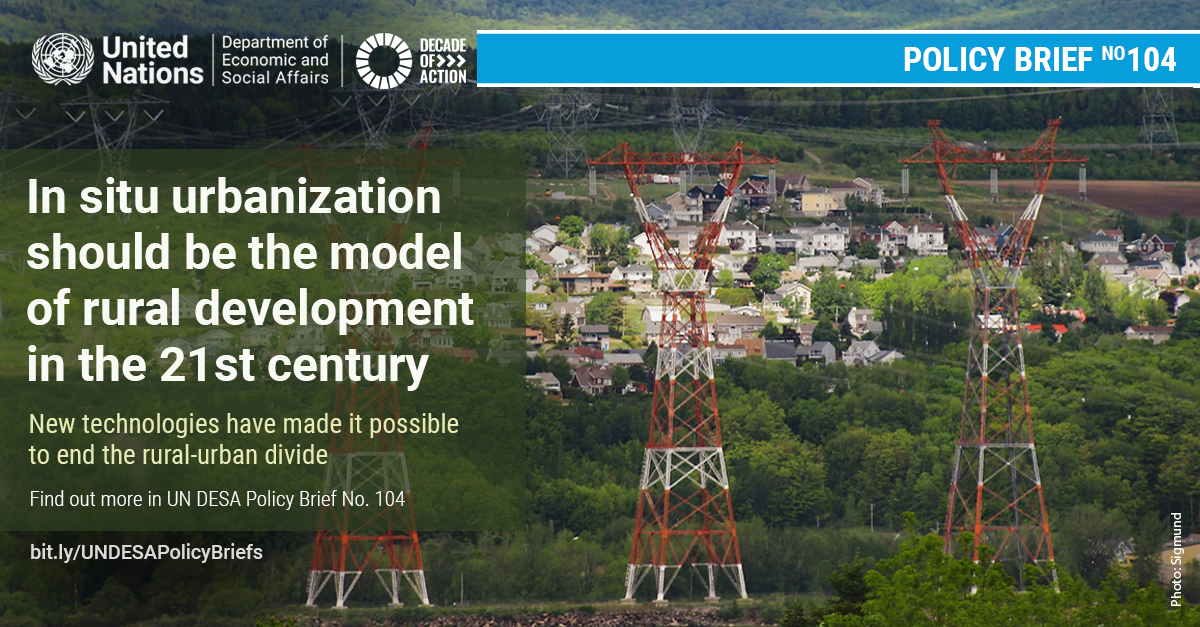 Policy Brief 104: In situ urbanization key to leaving no one behind
Policy Brief 104: In situ urbanization key to leaving no one behind Policy Brief 105: Circular agriculture for sustainable rural development
Policy Brief 105: Circular agriculture for sustainable rural development Policy Brief 100: Effective blended finance in the era of COVID-19 recovery
Policy Brief 100: Effective blended finance in the era of COVID-19 recovery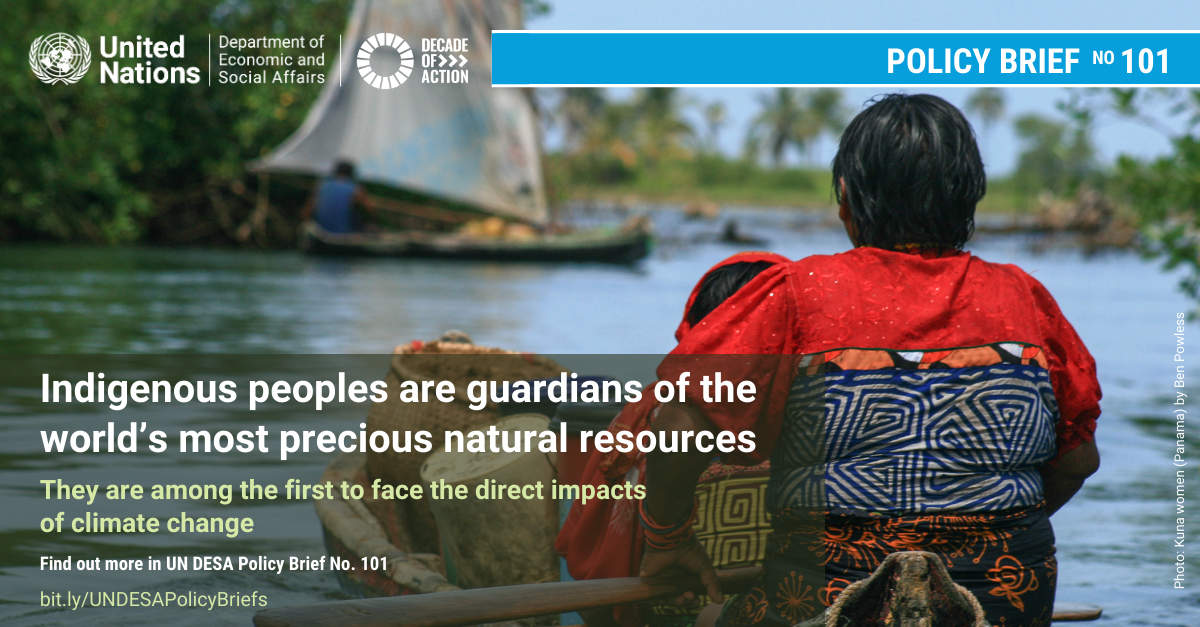 Policy Brief 101: Challenges and Opportunities for Indigenous Peoples’ Sustainability
Policy Brief 101: Challenges and Opportunities for Indigenous Peoples’ Sustainability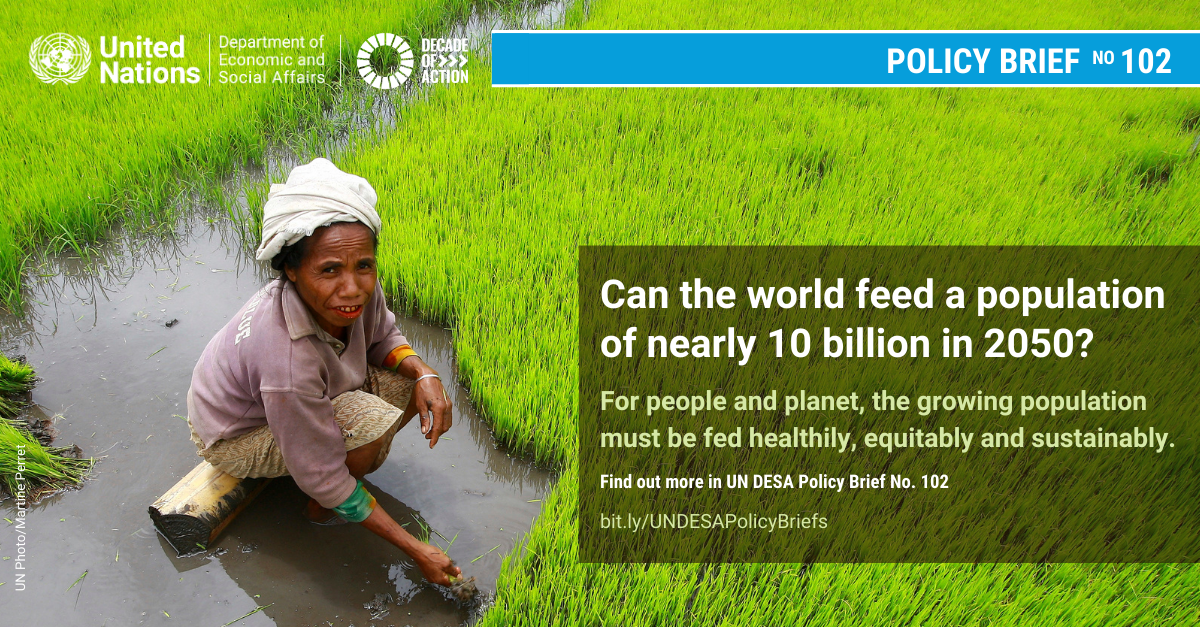 Policy Brief 102: Population, food security, nutrition and sustainable development
Policy Brief 102: Population, food security, nutrition and sustainable development Policy Brief 97: COVID-19 and Beyond: Scaling up Private Investment for Sustainable Development
Policy Brief 97: COVID-19 and Beyond: Scaling up Private Investment for Sustainable Development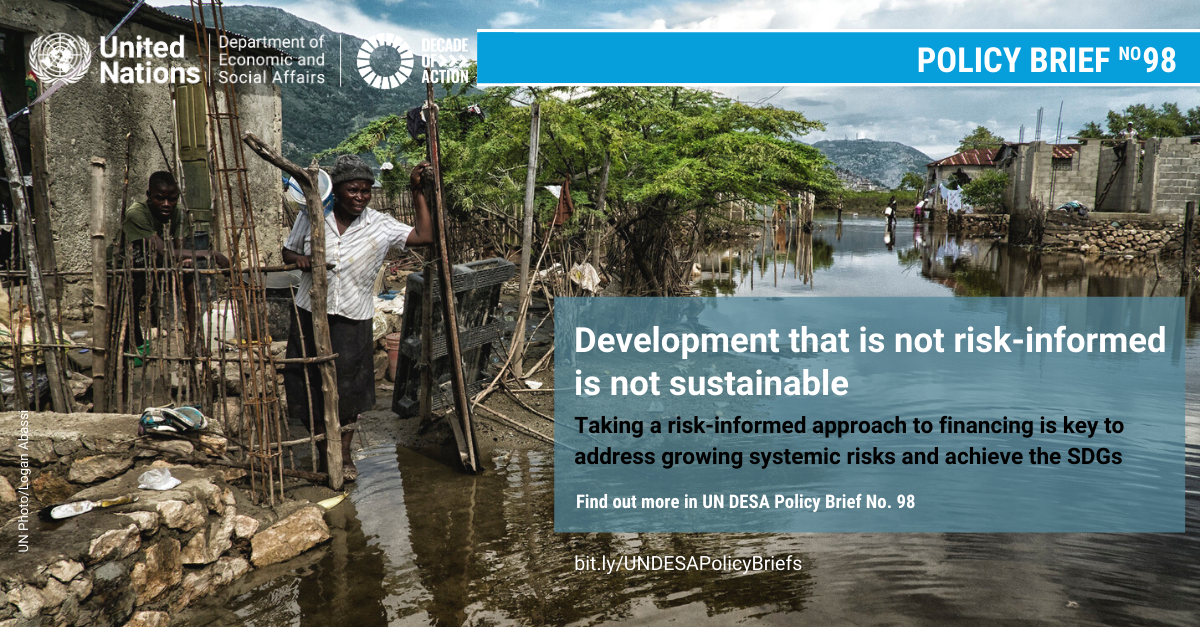 Policy Brief 98: Risk-informed finance
Policy Brief 98: Risk-informed finance Policy Brief 99: Why does corporate sustainability reporting matter to rebuilding better?
Policy Brief 99: Why does corporate sustainability reporting matter to rebuilding better? Policy Brief 94: A changing world of work: implications for the social contract
Policy Brief 94: A changing world of work: implications for the social contract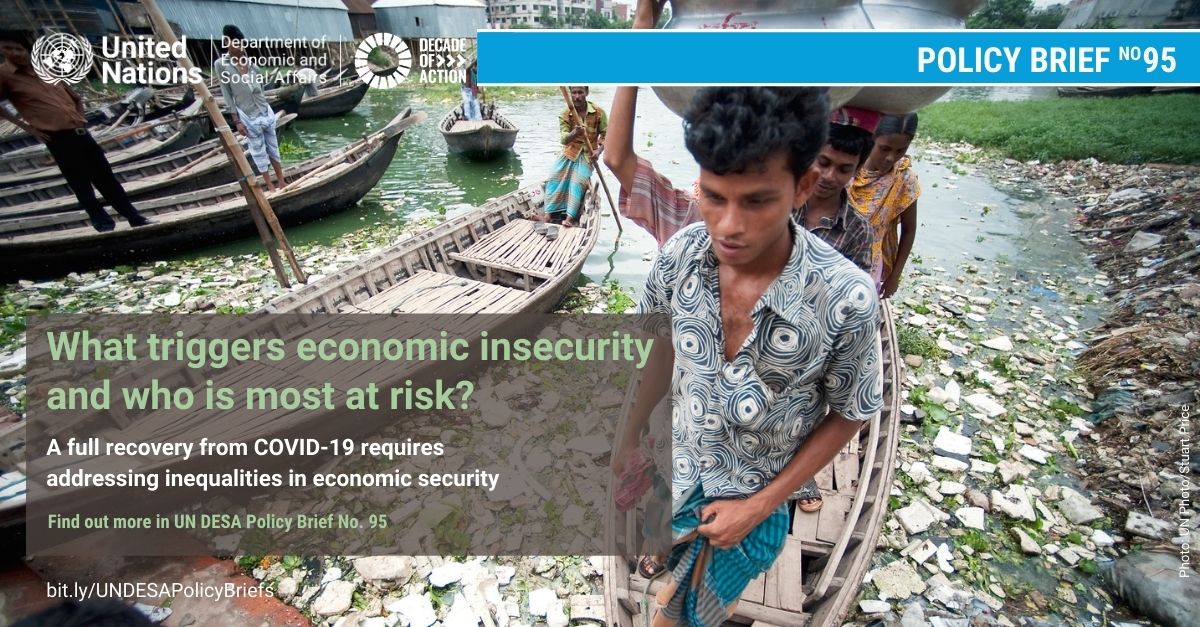 Policy Brief 95: What triggers economic insecurity and who is most at risk?
Policy Brief 95: What triggers economic insecurity and who is most at risk? Policy Brief 96: COVID-19: How the data and statistical community stepped up to the new challenges
Policy Brief 96: COVID-19: How the data and statistical community stepped up to the new challenges Policy Brief 91: The politics of economic insecurity in the COVID-19 era
Policy Brief 91: The politics of economic insecurity in the COVID-19 era Policy Brief 92: Leveraging digital technologies for social inclusion
Policy Brief 92: Leveraging digital technologies for social inclusion Policy Brief 93: Social policy and social protection measures to build Africa better post-COVID-19
Policy Brief 93: Social policy and social protection measures to build Africa better post-COVID-19 Policy Brief 88: Financing sustainable forest management: a key component of sustainable COVID-19 recovery
Policy Brief 88: Financing sustainable forest management: a key component of sustainable COVID-19 recovery Policy Brief 89: Strengthening Data Governance for Effective Use of Open Data and Big Data Analytics for Combating COVID-19
Policy Brief 89: Strengthening Data Governance for Effective Use of Open Data and Big Data Analytics for Combating COVID-19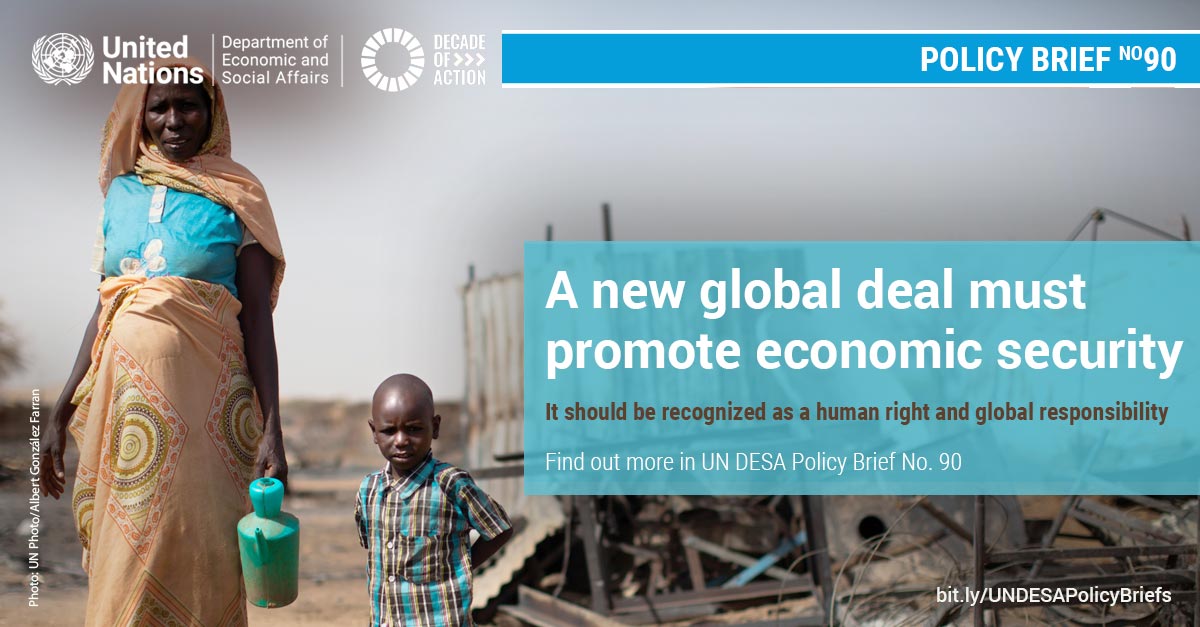 Policy Brief 90: A new global deal must promote economic security
Policy Brief 90: A new global deal must promote economic security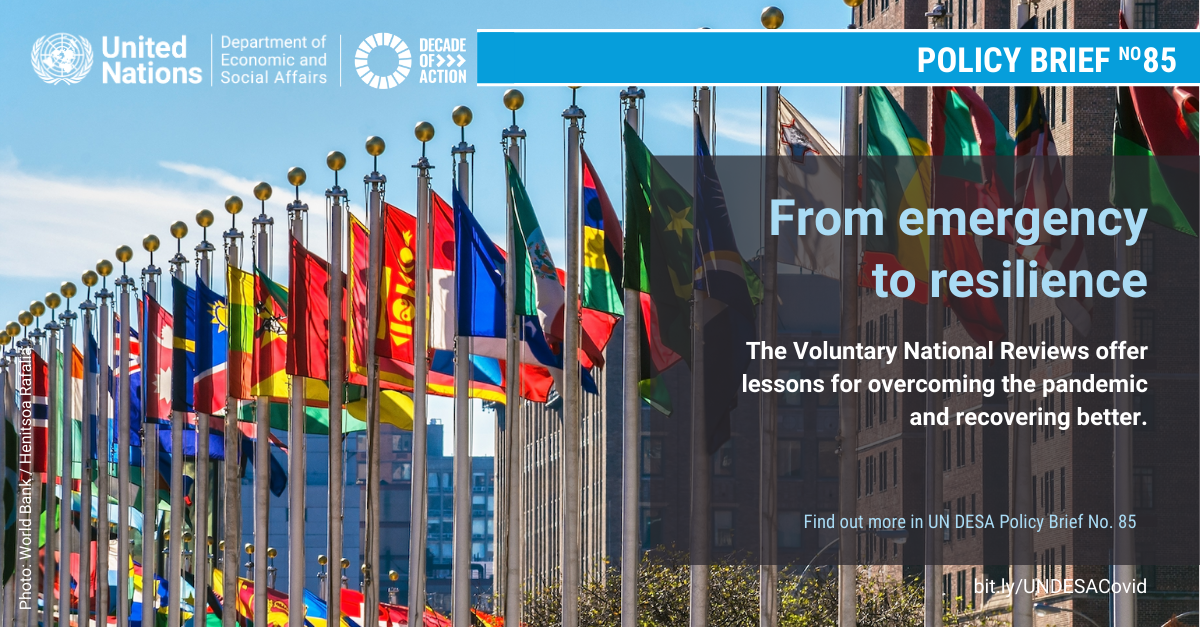 Policy Brief 85: Impact of COVID-19: perspective from Voluntary National Reviews
Policy Brief 85: Impact of COVID-19: perspective from Voluntary National Reviews Policy Brief 86: The long-term impact of COVID-19 on poverty
Policy Brief 86: The long-term impact of COVID-19 on poverty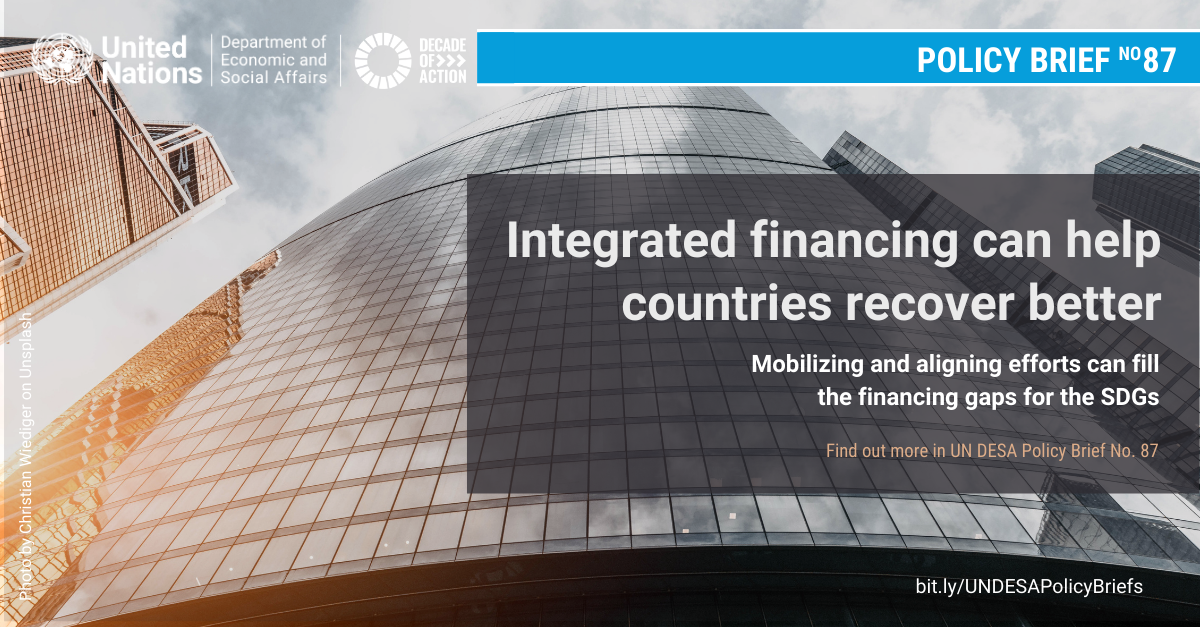 Policy Brief 87: Integrated national financing frameworks—a framework to build back better
Policy Brief 87: Integrated national financing frameworks—a framework to build back better  Policy Brief 82: COVID-19 and a primer on shock-responsive social protection systems
Policy Brief 82: COVID-19 and a primer on shock-responsive social protection systems Policy Brief 83: Recovering from COVID-19: the importance of investing in global public goods for health
Policy Brief 83: Recovering from COVID-19: the importance of investing in global public goods for health Policy Brief 84: Achieving SDGs in the wake of COVID-19: Scenarios for policymakers
Policy Brief 84: Achieving SDGs in the wake of COVID-19: Scenarios for policymakers Policy Brief 78: Achieving the SDGs through the COVID-19 response and recovery
Policy Brief 78: Achieving the SDGs through the COVID-19 response and recovery Policy Brief 79: The role of public service and public servants during the COVID-19 pandemic
Policy Brief 79: The role of public service and public servants during the COVID-19 pandemic Policy Brief 80: Forests: at the heart of a green recovery from COVID-19 pandemic
Policy Brief 80: Forests: at the heart of a green recovery from COVID-19 pandemic WESP June 2020 Briefing: A full-blown employment crisis in emerging economies
WESP June 2020 Briefing: A full-blown employment crisis in emerging economies Policy Brief 76: COVID-19 poses grievous economic challenge to landlocked developing countries
Policy Brief 76: COVID-19 poses grievous economic challenge to landlocked developing countries Policy Brief 77: How can investors move from greenwashing to SDG-enabling
Policy Brief 77: How can investors move from greenwashing to SDG-enabling Policy Brief 73: The impact of COVID-19 on sport, physical activity and well-being and its effects on social development
Policy Brief 73: The impact of COVID-19 on sport, physical activity and well-being and its effects on social development Policy Brief 74: Resilient institutions in times of crisis: transparency, accountability and participation at the national level key to effective response to COVID-19
Policy Brief 74: Resilient institutions in times of crisis: transparency, accountability and participation at the national level key to effective response to COVID-19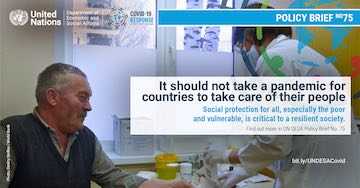 Policy Brief 75: COVID-19: Reaffirming State-People Governance Relationships
Policy Brief 75: COVID-19: Reaffirming State-People Governance Relationships Policy Brief 70: The Impact of COVID-19 on Indigenous Peoples
Policy Brief 70: The Impact of COVID-19 on Indigenous Peoples Policy Brief 71: COVID-19 pandemic deals a huge blow to the manufacturing exports from LDCs
Policy Brief 71: COVID-19 pandemic deals a huge blow to the manufacturing exports from LDCs Policy Brief 72: COVID-19 and sovereign debt
Policy Brief 72: COVID-19 and sovereign debt Policy brief 67: Protecting and mobilizing youth in COVID-19 responses
Policy brief 67: Protecting and mobilizing youth in COVID-19 responses Policy Brief 68: COVID-19 and Older Persons: A Defining Moment for an Informed, Inclusive and Targeted Response
Policy Brief 68: COVID-19 and Older Persons: A Defining Moment for an Informed, Inclusive and Targeted Response Policy brief 69: The COVID-19 crisis through the disability and gender lens
Policy brief 69: The COVID-19 crisis through the disability and gender lens World Economic Situation and Prospects (WESP) mid-2020 report
World Economic Situation and Prospects (WESP) mid-2020 report Policy Brief 65: “Responses to the COVID-19 catastrophe could turn the tide on inequality”
Policy Brief 65: “Responses to the COVID-19 catastrophe could turn the tide on inequality” WESP May 2020 Briefing: The pandemic crisis will worsen global inequality
WESP May 2020 Briefing: The pandemic crisis will worsen global inequality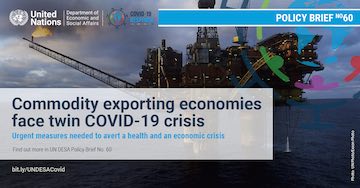 Policy Brief 60: “Commodity-dependent economies face mounting economic challenge as the pandemic ravages developed countries”
Policy Brief 60: “Commodity-dependent economies face mounting economic challenge as the pandemic ravages developed countries” Policy Brief 61: “COVID-19: Embracing digital government during the pandemic and beyond”
Policy Brief 61: “COVID-19: Embracing digital government during the pandemic and beyond”  Policy Brief 62: "The COVID-19 pandemic: a wake-up call for better cooperation at the science-policy-society interface"
Policy Brief 62: "The COVID-19 pandemic: a wake-up call for better cooperation at the science-policy-society interface"  April monthly briefing on the world economy: “COVID-19: disrupting lives, economies and societies”
April monthly briefing on the world economy: “COVID-19: disrupting lives, economies and societies” Policy Brief 58: “Addressing the social crisis through fiscal stimulus plans”
Policy Brief 58: “Addressing the social crisis through fiscal stimulus plans” Policy Brief 59: “Corona crisis causes turmoil in financial markets”
Policy Brief 59: “Corona crisis causes turmoil in financial markets” Financing for Sustainable Development Report 2020
Financing for Sustainable Development Report 2020  Which Economic Stimulus Works? By Joseph E. Stiglitz and Hamid Rashid
Which Economic Stimulus Works? By Joseph E. Stiglitz and Hamid Rashid “Intensified debt relief could save economies, prevent defaults”
“Intensified debt relief could save economies, prevent defaults”  “Data tells the story on how COVID-19 is changing the world”
“Data tells the story on how COVID-19 is changing the world”  United Nations' web site on Covid-19
United Nations' web site on Covid-19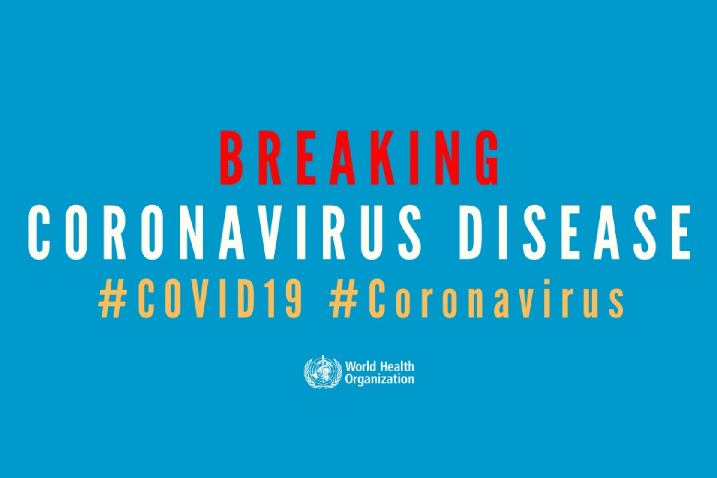 WHO website on the coronavirus
WHO website on the coronavirus COVID-19 Outbreak and Persons with Disabilities
COVID-19 Outbreak and Persons with Disabilities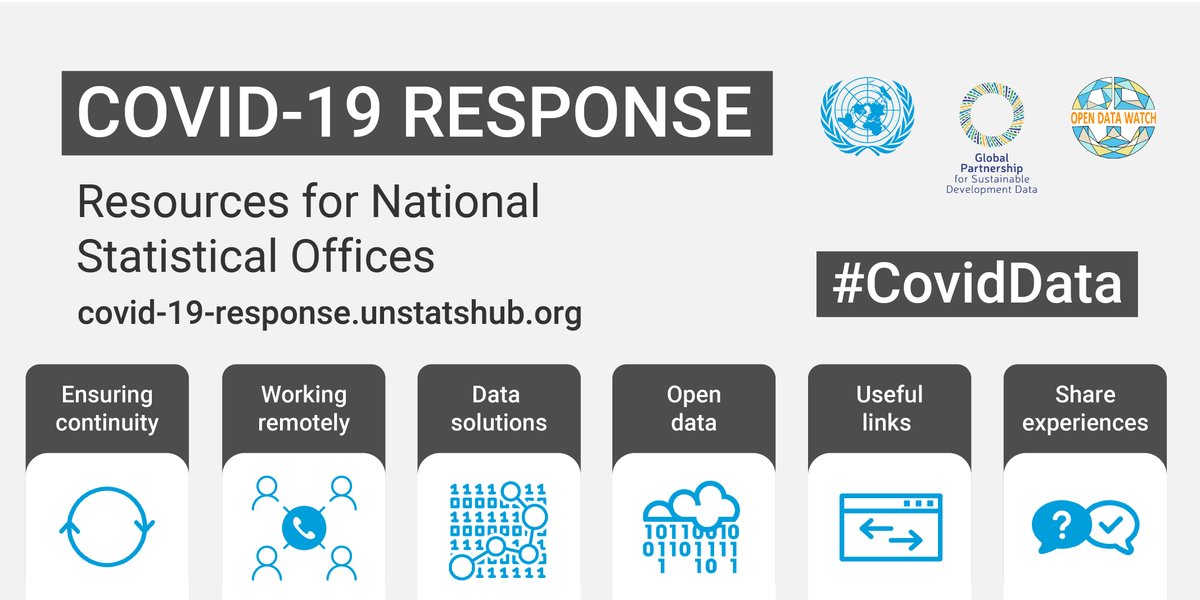

 COVID-19 and Indigenous Peoples
COVID-19 and Indigenous Peoples